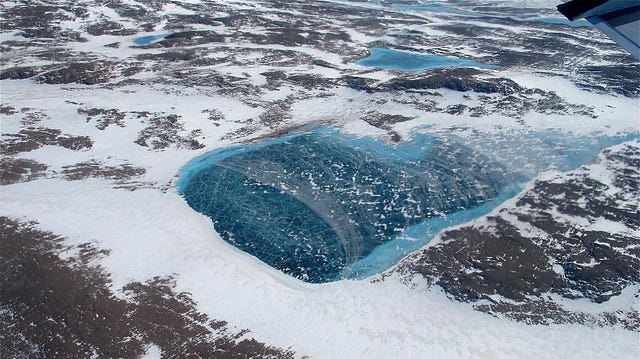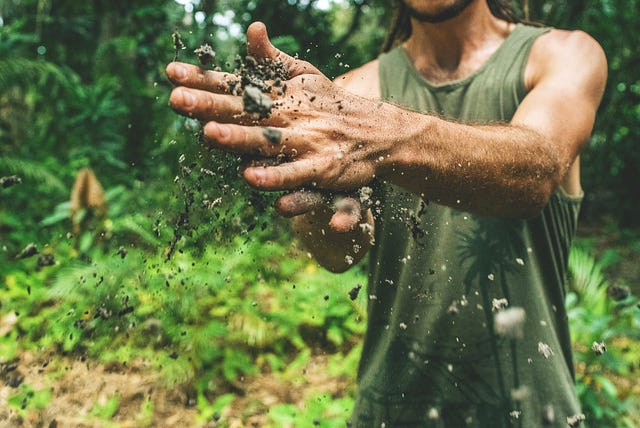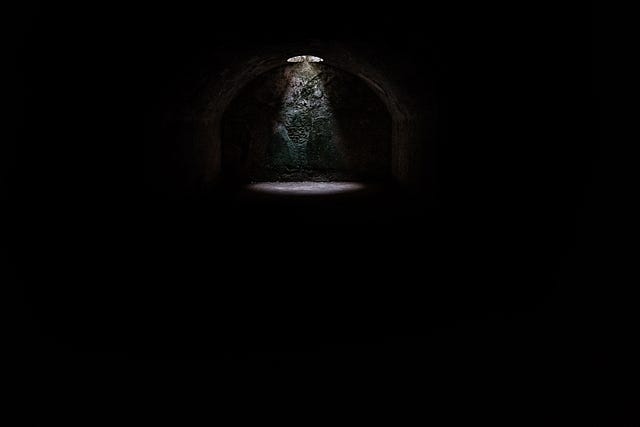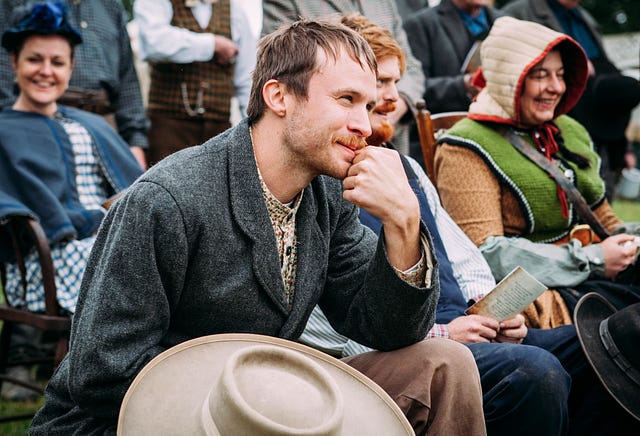The viability of our civilisation is uncertain. While opening our eyes means we’ll confront darkness, keeping them shut means it’ll stay dark. Let’s dare to look and start building new worlds alongside the old.
Dear reader
I offer you this essay in the hope that you may find something within it that will keep you buoyed in the years ahead. It reflects my own attempt to understand the converging crises in our near future, and to grapple with the question of what I might be able to offer that will be useful in that future.
It was the birth of my first child that catalysed a sense of urgency to take the idea-threads I had been tracing for some years now and to weave them into a relatively coherent whole. As any conscientious parent will testify, there are few things that will sharpen one’s focus on the future than a deeply felt sense of responsibility for a new being.
I feel obliged to issue a warning that you may find this essay a difficult excursion. If you are already in a vulnerable state of mind, you may consider waiting until you feel more resilient before reading on. The essay begins with a short tour of some bleak themes and my concern is that some readers may become lodged in this place. It moves through this though (kind of). The trajectory of the essay — and my core intent of the entire piece — is to move toward hope. That trajectory, however, requires that we begin with despair.

Despair
Dear future generations: Please accept our apologies. We were rolling drunk on petroleum. Kurt Vonnegut
If we were a more sensitive civilisation, despair could become the defining emotion of this era. We have plenty of reasons to feel it. Then again, if we were a more sensitive civilisation, the things that give us reason to despair would not be things at all. But that is not our world.
I am exhausted from despair. I’m sure you are familiar with the many converging crises that that can induce this state. To begin, there is climate change. The impacts that have already occurred — including arctic and sheet ice loss, as well as increasing storm, drought and flood frequency — are at the very worst end of predictions that were made in the early 1990s. Meanwhile, the human activities driving these changes show little sign of stopping. This alone seems beyond our capacity to resolve. Yet it’s only the beginning. There is the depletion of conventional oil and gas reserves, forcing expensive innovation to access deeper and more remote reserves, gradually shrinking the energy return on energy invested toward a non-viable state. There will be supply for some time to come, but the age of cheap, abundant energy is slowly coming to an end. Then there are our topsoils, which are rapidly disappearing. Ocean acidification is rising and overfishing has caused catastrophic dwindling of fish stocks. Worse still is that at sea and on land the sixth mass extinction in the history of Earth is already underway, with the current pace of species loss outstripping the average for the last ten millions years by an extraordinary margin.
Our problems don’t even end there. To our environmental woes we should add the rapid growth in exponential technologies coupled with a fundamentally rivalrous global political dynamic. Similar to the splitting of the atom, the rise of artificial intelligence, bioengineering and nanotechnology hold the potential for immeasurably good ends for humanity and life on Earth. But as with nuclear technologies, the rivalrous nature of our relationships with each other guarantees these technologies will be subject to a weaponisation race. In this way we will multiply both the means by which humanity might extinguish itself and other life along with it, and the likelihood of self-termination.
Finally, there remains the most existential risk of them all: our diminishing capacity for collective sensemaking. Sensemaking is the ability to generate an understanding of world around us so that we may decide how to respond effectively to it. When this breaks down within the individual, it creates an ineffective human at best and a dangerous one at worst. At the collective level, a loss of sensemaking erodes shared cultural and value structures and renders us incapable of generating the collective wisdom necessary to solve complex societal problems like those described above. When that happens the centre cannot hold.
Threats to sensemaking are manifold. Among the most readily observable sources are the excesses of identity politics, the rapid polarisation of the long-running culture war, the steep and widespread decline in trust in mainstream media and other public institutions, and the rise of mass disinformation technologies, e.g. fake news working in tandem with social media algorithms designed to hijack our limbic systems and erode our cognitive capacities. If these things can confound and divide us both within and between cultures, then we have little hope of generating the coherent dialogue, let alone the collective resolve, that is required to overcome the formidable global-scale problems converging before us. And so it seems, as Daniel Schmachtenberger might say, we are approaching the power of gods, but without the wisdom of gods.
How exactly did we arrive at this place? If you’re reading this in the early twenty-first century, then you were born at a unique point in human history. Our era has been characterised by an unusual degree of political and economic stability and prosperity, owing to a plentiful resource base and an ever more sophisticated ability to exploit it. The harm we wrought with industrial technology was not evident when this chapter began, but even after it became clear we were devouring the very substrate upon which our own livelihood depends, we continued just the same. With each mouthful, each purchase, each flight or road-trip and each delayed remedial effort and externalised environmental cost, we collectively and gradually shaved away a host of better futures. Somewhere along the line, we slipped into the orbit of a terrible mass of our own making.
Some of us still grasp for levers to pull, but they are now mostly beyond reach now. We may have been originally responsible for putting the flame to the tinder, but now we are contending with a bushfire beyond our control. The problems before us are emergent phenomena with a life of their own, and the causes requiring treatment are obscure. They are what systems scientists call wicked problems: problems that harbour so many complex non-linear interdependencies that they not only seem impossible to understand and solve, but tend to resist our attempts to do so. For such wicked problems, our conventional toolkits — advocacy, activism, conscientious consumerism, and ballot casting — are grossly inadequate and their primary utility may be the self-soothing effect it has on the well-meaning souls who use them.
I reject the notion that this is pessimism. It is a sober acknowledgement of our collective reality. The evidence is in — even if we manage to avoid the worst applications of exponential technologies, we are at minimum already committed to an environmental catastrophe at a scale humans have never endured, and whose consequences we cannot fully fathom. The implications, for instance, of findings delivered by the International Panel on Climate Change are that, in order to avoid climate catastrophe we should already be achieving massive reductions in emissions today, and if we fail to make up for lost time by 2030, then we will have passed the point of no return. But we aren’t even in the realm of achieving this. Emissions are at record highs and continue to climb with no sign of meaningful abatement. Even complete compliance with the Paris Accords puts us on track for three degrees of global warming, by which time the thawing of tundra permafrost, disappearance of arctic ice and melting of the Greenland ice sheet are predicted to set in motion a series of self-reinforcing feedback loops that will see warming spiral well beyond our control. That’s only to speak of climate change alone, let alone the myriad of implications of the other ecological and socio-technological crises.
The world our children will inherit will not be the same one we enjoyed. Today, warnings of civilisational collapse are no longer the domain of street-corner kooks wearing hand-scribed sandwich boards. Such sentiments are also echoed by some of our most accomplished and respected minds. To say that fundamental change is certain renders too benign a picture. Better put, we are somewhat fucked.
So what then is left for us to do except scramble vainly to dampen a world-ending fire?
Well, ‘fucked’ is a spectrum. I said we are somewhat fucked. We’re not completely fucked… yet. Despair is a necessary step, but only the first of many. There is so much to be done. It’s just not what you probably think.
Photo by Jez Timms on Unsplash
Imagination
The end of the world as we know it is not the end of the world full stop. Together, we shall find the hope beyond hope, the paths that lead to the unknown world ahead of us. Paul Kingsnorth & Dougald Hine
Most of us lack the stories that help imagine a future where we thrive in the midst of unstoppable ecological catastrophe. To borrow a phrase from storyteller Martin Shaw, this is because our imaginations have been colonised by things that don’t always mean us well.
We have been propelled to this point by the myths of progress, limitless growth, our separateness from nature and god-like dominion over it. These myths have shown up in our stories in peculiar ways of late. Since around the turn of the millennium there has been a surge in post-apocalyptic fiction. A steady stream of films, television series and novels have portrayed desolate and barely habitable future landscapes, often roamed by marauding bands of psychopaths, flesh-eating zombies or similar agents of malevolence. The frequent appearance of post-apocalyptic themes undoubtedly reflects our rising collective existential anxiety about our future. But perhaps more telling is the recurring themes of horror, deprivation and dystopian political order that nearly always characterise these depictions of the future. It seems our minds have been so thoroughly colonised by the myths of growth and progress that we cannot imagine how the collapse of the current order could possibly produce a future that resembles anything short of hell.
If we are to find a new kind of good life amid the catastrophes these myths have spawned, then we need to radically rethink the stories we tell ourselves. We need to dig deep into old stories and reveal their wisdom, as well as lovingly nurture the emergence of new stories into being. This will not be easy. The myths of this age are deeply rooted in our culture. The talking heads (even the green ones) echo these myths with the dogmatic fervour of zealots. They talk of “saving the planet” through transitioning to a “sustainable” future, primarily through new renewable energy technologies. They seem only able to conceive of a good life that mirrors our lives more or less as they are now, where the living standard continues to improve and rate of consumption continues to grow, yet somehow decoupled from all the pollution, destruction and guilt.
Their vision is fantastical: growing numbers of people placing ever greater demand on diminishing critical energy and environmental resources in an increasingly unstable climate, amidst fragmented global political will and declining trust in public institutions, and the increased availability of powerful technologies to actors whose intentions may be far from peace, harmony and ecological sustainability. For anyone to think this story plausible, they must lean heavily on faith that a deus ex machina has been written into the script of our near future. They must believe, contrary to any available evidence, that a string of technological quantum leaps and extraordinary political convergences will suddenly occur and save us. In other words, they must believe in miracles.
It’s not that I don’t believe in miracles. It’s just that I refuse to bet my children’s future on one. Evolution is characterised precisely by remarkable adaptations to new challenges that we might call miraculous, yet such shifts tend to transpire over tens of thousands of years. In contrast, we have mere decades at most, but likely less than that. If such a rapid onset miracle does manifest, then wonderful — I’ll be as grateful as anyone. But what if such miracles never come? My children deserve better than “we just thought they’d figure something out in time”. Magical thinking, blame and the expectation that others — including our governments — will fix our problems and save us are the hallmarks of a childlike worldview. In contrast, to take the world as you find it, to assume responsibility for that which you can, and to act as if what you do actually matters, is the mark of a mature adult.
My young children need me to be an adult. They are the reason I feel despair so profoundly. Yet they are also the reason I cannot wallow in it, acquiesce to it, or turn away from the horror. This is the reason I have sought to imagine another way, and to find and focus on that which I might do to usher that vision into existence, and to behave as if what I do really matters for their future. They are the reason I have directed my imagination to the multitude of paths only visible once I looked beyond the myths that have clouded much of my thinking. It is up to me show them a way beyond grief to a way of life truly worth living for, even if it isn’t the path I had expected to be showing them.
New hopes are able to rise in our consciousness when we relinquish old ones. Opening your eyes means that you will see darkness, but keeping them shut means it will always remain dark. Indeed, on the other side of despair, peering through adult spectacles, I have found a hope. It is more tangible than a miracle, and it’s already being forged. It’s not a call to world-saving action. The time for that has expired. It’s something more on a human scale. No faith in miracles is required. All that is needed is to cross the threshold with ready hands and a sense, even a vague one, of what might be yours to do.
Photo by Clem Onojeghuo on Unsplash
Community
We cannot live for ourselves alone. Our lives are connected by a thousand invisible threads, and along these sympathetic fibres, our actions run as causes and return to us as results. Herman Melville
As I’ve hopefully made clear, the jumping-off point for this essay is a regrettable acceptance that a forthcoming energy descent combined with multiple ecological crises will force massive societal transformation this century. It’s hardly a leap to suggest that, with less abundant cheap energy and the collapse of the complex political and economic infrastructure that supports our present way of life, this transformation is likely to include the contraction and relocalisation of some (if not most) aspects our daily lives.
The idea of contraction may conjure a sense of impending doom in some readers. That instinct is perhaps partly what drives someone like Steve Huffman, the CEO of Reddit, to start preparing for the worst. “I have a bunch of guns and ammo. Food.”, he said in an interview for The New Yorker in January 2017, “I figure that, with that, I can hole up in my house for some amount of time.” But survivalist preppers like Huffman have it fundamentally wrong. If the extent of your preparations for the crises ahead consist of building a doomsday bunker or designing the ultimate “bug out bag” and a plan to head for the hills where you’ve buried a cache of food, water, and weapons, then I wish you luck because history would suggest you have overlooked an essential ingredient.
The greatest weakness of survivalism — besides lacking the imagination to envision a future beyond self-preservation, rationing and a descent into depravity — is that the prepper largely conceives their activities as an individual affair. They prepare to protect themselves and perhaps a select few others by erecting barriers and shutting out a crumbling world. This misses a critical point: the resilience of humans depends less on their individual skill and intelligence and more in their ability to pool skills and intelligence, enter into coherent relationships with others, and cooperate on common goals. We even have a name for this kind of arrangement. We call it community. Humans are the only species of hominid capable of forming and sustaining cooperative relationships at scale for the purpose of pursuing mutually beneficial endeavours. On balance, these arrangements tend to generate more value for everyone than individuals can generate separately. Community is fundamental to the human experience, underpinning our capacity to both survive and thrive through difficult times.
When I say ‘community’, I’m not talking about an abstract cosmopolitan global community of citizens or some online virtual assemblage of people with a shared interest in glass mosaics, gardening or dank memes. I’m talking about a community defined uniquely by a place, and a people whose identities and daily lives are inextricably woven into the fabric of that place as well as into each other. It is a community at the human scale whose health is manifest in such things as a thriving informal economy of exchange and gifts, a native code of civility and conflict resolution, a sense of responsibility and mutual obligation, and the confidence and ability to decide its own goals, destiny and the actions it will take to get there.
Something important happens when we gather in pursuit of a common goal. First we form rituals that help us relate to and negotiate each other, everything from a civic tradition that allows anyone with a voice to be respectfully heard, to sharing food and music in the local town hall every Friday night, to a labour system that fairly distributes the burden of work. Then, those rituals that stand the test of time become embedded in daily life. The ritual activities themselves and the good they produce help a community identity take root. As identity strengthens, so too does our sense of connectedness — our sense of affection, responsibility and obligation — to one another. When this happens, we then share a greater capacity for coherence and cooperation. And where we share greater capacity for coherence and cooperation there is also greater resilience: the ability to mobilise skills and resources to support the emergence of collective intelligence in response to crisis, enable rapid adaptation and ensure the continuity of the most important functions and structures of the community. This coherent togetherness and the collective intelligence that emerges out of it is the source of human strength and ingenuity. Within it lies our ability to transition from one evolutionary niche to another, even against the odds.
Of course, community also gives us the very stuff we live for. Families, friends, art, music, stories, conversation, humour, love, belonging, good food and drink. These are the things that nourish us and make crisis and the discomfort of transition worth enduring. When we have these things, we have the good life. In exchange, community asks us a simple question: what do you bring to the table to offer others? What can you help to build? What is your role in this work?
Our age is one inundated by bullshit, where our relationships are mediated by things that sanitise and flatten our humanity. The bullshit distracts us from the fact that the tethers between us are being frayed. Perhaps this is what has produced the crisis of meaning afflicting so many today. The most profound meaning in our lives is located in the ties that bind us together. Many on their deathbed have attested that the quality of our connection with others is that which matters above all else. To that end, the calling is to shed the things that separate us, reacquaint ourselves with one another in our families and communities. In doing so, we reacquaint ourselves with meaning, and only then can we see clearly enough to begin realigning our economies and political structures to serve that which is meaningful.
This is why I do not feel called to stockpile, build a wall, and batten the hatch. Instead I feel called to open up and build the tiny world that may not extend all that far beyond my town. If many of us join together in that task and we do it well, then we will find a good life in our future, despite the collapse of the world we were born into. If we can sustain this good life, we may even discover a way to scale it to our regional, national and global levels. But even if my work only begins and ends on my own street, or my own home, this is important work nonetheless.
If we are to continue to thrive, we will need to know how to find and be with each other again. If our children are to thrive, we need them to know how to build and keep safe these bonds that nourish. That work starts at home.

The work
You never change things by fighting the existing reality. To change something, build a new model that makes the existing model obsolete.
R. Buckminster Fuller
As I see it, my job is not to fix the system or prevent its collapse. This is a fool’s errand. In ecological terms, collapse merely signals a phase shift from an inherently unsustainable ecology to a sustainable one. Of course, in human terms this involves the unraveling of the structures of civilisation upon which we depend — which could last anywhere from decades to centuries — thereby disrupting our way of life. For many species, this is almost certainly a recipe for enormous suffering. But unlike many species, the behaviour of humans is not wholly dictated by their genetic code. Culture also plays a role, meaning that humans have a unique capacity for rapid adaptation as the ecological system shifts. Although some suffering is likely, it may not all be inevitable.
I therefore take my task to be in finding the ways of living that preserve dignity throughout collapse and, more importantly, to create a lineage of ideas, traditions, rituals and institutions that might be useful after it. To that end, my job is to be attuned to the existing system, to work within it to the extent that I must, but to also work in parallel to it, experimenting in building the relationships, tools and structures that may be of use in reestablishing a good life when the centre begins to give way.
It is not clear to me what the work will require of me precisely, but what does seem clear is that there are few threads of work worth following. The first thread is the cultivation of deep humility. Technocratic arrogance, narrowly conceived problems and hastily deployed solutions are precisely the things that have led us to this point. Grand ideologies will not serve us well either. The past tells us that good intentions are not enough, that utopian models of the future are a dangerous mirage, and that we’d be wise to regard simple yet plausible-sounding narratives about our complex world with suspicion.
Instead, deep listening is needed. To listen deeply — to become profoundly aware of all aspects of your environment and your place in that system — is fundamentally a spiritual practice that reveals to us the essential interconnectedness of everything. It changes us as a consequence. Perhaps this is what is needed in order to shatter our sense of separateness from nature. Yet this change won’t occur through devouring propositional knowledge or via rhetorical persuasion. It is knowledge only gained through participation in the practice of deep listening itself.
The second thread is finding coherence, with one’s self, with each other and with place. We don’t know today what things will enable us to solve the problems of tomorrow. Our biggest problems are emergent and non-linear and most won’t be solved with linear thinking. Only emergent collective intelligence can produce non-linear solutions. This requires us to first cultivate our own ability to be present, perceive the world accurately, orient ourselves toward it, and find ways to give creatively. It also requires that we find new ways to assemble with people with diverse perspectives who are capable of coming into coherent relationships with each other for long enough to produce something worthwhile. We can’t come to such spaces laden with off-the-shelf ideologies born of old modes of thinking. As Albert Einstein said, “we cannot solve our problems with the same level of thinking that created them.” It must be approached with humility and a beginner’s mind, ready not with solutions, but only the ability and steadfast commitment to observe, respond, fail, learn and repeat.
Coherence is hard. It requires a deep commitment to show up, and to keep showing up, to support each other in building our individual capacities to bring the best version of ourselves into the relationship. It’s a significant commitment, but it begins with simple conversation. This alone may go some way to regenerating the skill of relating to each other deeply. Many of us are out of practice since being largely divorced from community, barely acquainted with our neighbours let alone the wider town or suburb populace. We’ve become accustomed to our relations being mediated by sterile, functional economic exchange. Money has replaced the gift and exchange economy in almost every way, from our milk and bread supply to our means of sourcing care for our very young and very old. Relearning the skill of finding right relationship and coherence with each other in conversation itself may be the most significant part of the work.
We’ve also fallen out of relationship with the places we inhabit. The work necessarily involves moving consciously in these places again, slowly, to allow ourselves the space to learn its rhythms, its patterns, its history and potential. The grain tends toward the global. Yet it has been in part the placelessness of liquid modernity that has ripped us from our roots. We may then need to return fully to the local for a time, to even become parochial, in order to re-root and embed ourselves in the landscape and send out tendrils from our toes. A fundamental folly of modern civilisation is that we have forgotten that we humans are an emergent property of a massive ecology, the whole of which is the ultimate arbiter of our lives, our communities and our civilisation. There is no getting around it. So we must learn to dance with the places we inhabit.
The third thread is conservation. For its many flaws, Western civilisation has produced some of the greatest accomplishments of recorded human history. From the rule of law to the sovereignty of the individual, from its art and music to philosophy and science, the western tradition remains rich with value. Our task is to slowly and carefully decide what traditions we will carry forward. Decoupling them from their undesirable effects is difficult, if not impossible in many cases. If we want to keep the baby, we may sometimes need to keep some bathwater as well.
The West is, of course, not the only tradition with value worth carrying forward. Nor is ours the only age containing all that is good. We should expect and encourage a renaissance of sorts, an exploration and melding of cultures including those other than our own, and facilitate a rebirth of that which is old but good. It requires us to be conservatives on one hand, preserving and passing on what we have that is good, and radically progressive on the other hand, ready to meld the old ideas and traditions with new, the familiar with the strange, so that we may give birth to useful novelty.
The requirement for novelty in the face of unprecedented predicaments is why we should pursue the final thread: experimentation. Most good ideas ever tried throughout history have failed, some quietly and others catastrophically. Our traditions are those ideas that emerged over time as the things that worked repeatedly over hundreds if not thousands of years. We don’t know what will work in an uncertain future. The odds are against us, which is why we need as many people attempting as many different things as possible. Most will fail, but if we collectively keep moving, keep talking to one another, and keep moving toward the higher ground, we may eventually stumble upon the paths that will lead us there.
This is not a pursuit of a new shiny utopia. It is a muddling along to find the things that work. What we’ll create will at first seem a hodge-podge assembly of the strange and beautiful. In our lives, we may only ever amount to scaffolders. But in humility we may carry on toiling in the knowledge that we are preparing the way for our children and children’s children to become the architects of something more beautiful and intricate than we can fathom today.

Muddling along at sea
There will be time for music. David Fleming
The grand cruise liner of modern industrial civilisation has been taking on water for some time now. The engineers deep in the hull have reported that it’s gushing in faster every day through multiple breaches. They say it’s beyond patching now. They say there’s a very good chance the ship won’t make it unless it’s immediately dry-docked for repairs. But that is unlikely to occur. Those on the bridge have heard the engineers’ assessments, but they are at loggerheads over what to do. Some are ready to act urgently, while others doubt the engineers’ assessment and want to stay the course. Even if the engineers are right, they say, they’ll surely find a way to fix it just in time.
The word has also spread throughout the passengers decks. Some have descended into the hull and have joined the bailing effort. Others have ascended to the bridge and are banging on the windows, demanding those at the helm act swiftly. At some point, some of those pounding on the glass will break through, and in their attempt to commandeer the ship, there will be blood pointlessly spilled. Yet most passengers, even if they’ve heard the rumours, are either too distracted with the onboard entertainment or all-you-can-eat buffet. “If the ship is going down,” they say to each other, “then why are the waiters still refilling the dessert bar?” Meanwhile, others passengers have taken refuge in the bar where they sit, sunken into their chairs, paralysed in despair.
Then there are those who have quietly disembarked the ship. Look overboard and you’ll see them. They’re not fleeing for dry land though. They’re staying close by. You’ll see more paddling toward rafts they’ve built from whatever they could harvest with their own hands. In groups that seem to grow and contract on a loop as if breathing, they are working feverishly, yet creatively and playfully. They’re building structures on the water, only to pull them down again and reconfigure until they settle on a more elegant shape. The more who join the raft-builders, the more elegant their structures become. Some return to the ship for a time to learn, to understand what might be useful, and to bring these things back to the rafts and integrate them into their structures.
Not all newly assembled structures seem to work. In fact, most don’t. They are experimenting with different combinations of novelty and time-tested traditions, rebirthing the latter and fusing it with the former. The results are unpredictable and many rafts sink midway through construction. And so it goes, they muddle along until they find some way of being all at sea.
Some builders occasionally glance back at the ship and wonder if they’ve made a mistake. Right now the ocean liner is afloat. Above the water line, there are few signs of distress. You can even see people sipping pina coladas on the sun deck and playing shuffleboard. The band is still playing. Can this really be what a sinking ship looks like? But they know that once a threshold is crossed, the weight of water filling the hull will drag the entire hulk beneath the waves within mere hours.
The builders do this work because when the ship’s descent into the abyss accelerates, those aboard will need to look to something that will abate the terror. Something to swim towards. They will need to see something that offers a hope beyond hope that they might climb aboard or even emulate. What the builders have created may look shabby now, but all elegant things begin in exactly this way. They know this and they share stories with one another that speed along this transmutation. Their transition may take decades, perhaps centuries. They’ll carry on working. Together, they’re dreaming of a pontoon archipelago where the sun never sets without music.
Let this darkness be a bell tower
Quiet friend who has come so far,
feel how your breathing makes more space around you.
Let this darkness be a bell tower
and you the bell. As you ring,
what batters you becomes your strength.
Move back and forth into the change.
What is it like, such intensity of pain?
If the drink is bitter, turn yourself to wine.
In this uncontainable night,
be the mystery at the crossroads of your senses,
the meaning discovered there.
And if the world has ceased to hear you,
say to the silent earth: I flow.
To the rushing water, speak: I am.
Sonnets to Orpheus II, 29. By Rainer Maria Rilke







